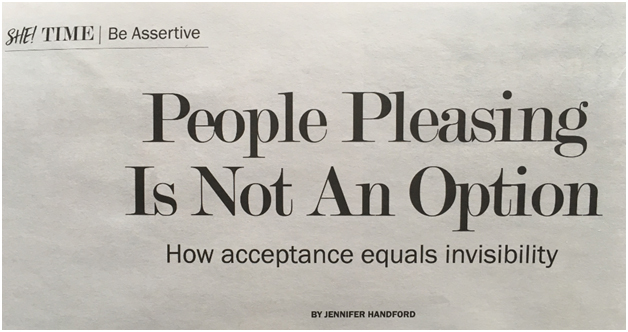




You know my good friend, Katie. Teacher-of-the-year. Patient, kind, loves kids of all ages. She’s dedicated her life to the classroom, has worked for years to finish her Ph.D., and can’t get enough of continuing education. She was telling me about her desire to run for the school board. It’s a volunteer position, as in, more free labor on her part for the good of our kids and the community, yet she was hesitant. “What if I lose?” she wondered. “Worse, what if I win?”
She went on to express her concerns with winning. Would people think she was greedy for power, too ambitious, an over-reacher? Would her colleagues in academia think she was abandoning her ideals for the classroom in search of a grander position? Would she be able to disagree and stand her ground while preserving friendships?
Katie’s concerns were valid, especially for women, who are expected—even at the highest levels of the corporate and academic world—to maintain a nurturing and friendly personality. “Being liked” isn’t just a desirable ideal for women, it’s an expected norm. It refers back to what the research has sadly shown, that success and likeability are negatively correlated for women. That is, when a woman is successful, she is often liked less. This places a much heavier burden on women to balance their passions with their need to remain a sensitive caregiver of just about everyone’s feelings.
All of this explains why so much of the time we—as women—talk ourselves out of pursuing a path we’re passionate about. We’re scared, embarrassed, and nervous about what people might think if we have an idea, if we change a job, if we attempt a new endeavor. We are our own worst enemies. With an impressive amount of lawyering, we convince ourselves that the time isn’t right, the market isn’t receptive, or our financial situation isn’t sound enough. We’re afraid of not being liked, so instead of taking the risk, we downplay our abilities, our chances, and achievements. We hold back, for the sake of acceptance.
Settling into a life of mediocrity, however, is the wrong trade-off for being seen. The world is waiting for us to share our gifts. Each of us has something to say, give, a talent that is uniquely ours. It’s the one thing we have and our only goal in life should be to find out what that special something is so that we may share it with the world. Katie—as a dedicated educator—has knowledge and passion to enrich the school board. Allowing fear to hold her back is not only is a detriment to her, it’s a loss to a far-reaching community.
The key is to go for it with our whole heart. To not make decisions out of fear disguised as practicality, to not be lulled into thinking that some decisions are more responsible, more practical, more sensible than what we really want to do. We need to give ourselves permission to go after our passions. Jim Carey, in his commencement address to Maharishi University, phrased it perfectly, “Your need for acceptance can make you invisible in this world.”
Katie ran for the school board. She won her position. There will be plenty of her friends who are truly happy for her, there will be some who are not, based on their own issues and insecurities, but dissent and disagreement are part of the game. We can’t worry about pleasing everyone; we can only be concerned with what we have to say. It’s a matter of knowing our heart and finding our voice. If we do that with honesty and authenticity, there will be no shame in failing or succeeding.
VOLUME 1 ISSUE FALL/WINTER 2016